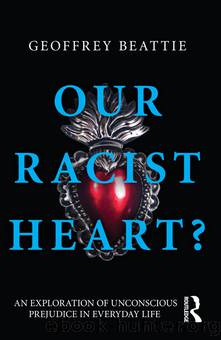Our Racist Heart? by Beattie Geoffrey;

Author:Beattie, Geoffrey; [Geoffrey Beattie]
Language: eng
Format: epub
ISBN: 1181067
Publisher: Taylor & Francis Group
So the experimental participants might end up with:
1b. Replace the old shoes.
2b. The sky is grey.
3b. We should now withdraw.
4b. Let us play bingo.
5b. Sunlight makes raisins wrinkle.
In their study, Bargh et al. effectively primed their participants with words associated with being elderly, embedded in each of the original lists:
âoldâ
âgreyâ
âforgetfulâ
âbingoâ
âwrinkleâ.
The participants thought they were just doing a language task but what Bargh was actually doing was unconsciously priming them to think about being old. The researchers then asked participants to walk down a hallway by the laboratory and somewhat incredibly they found that those people who had been primed in this way, walked more slowly as a consequence than those who had not been primed.
The question that Holland and his colleagues then asked was âCan we cue people unconsciously to clean using a similar priming technique?â They tested their idea with a number of experiments. In the first experiment, they used a lexical decision task where people have to decide whether a string of letters on a computer screen is a real word or not. Participants have to press a âyesâ or a ânoâ key and the researchers measure the time in milliseconds to press the key. The researchers looked at the effect of a slight hint of citrus (the smell of a cleaning product) in the experimental cubicle on this lexical decision task, in which the participants had to decide whether a string of letters was a real cleaning-related word or not. The participants were also asked what they thought the study was about and whether they noticed any particular smell in the cubicle (and if so, what the scent was).
They found that participants in the âcitrus smellâ condition responded faster to the cleaning related words than the participants in the control condition (with a mean latency of about 590 milliseconds in the smell condition compared to 620 milliseconds in the control condition for the cleaning related words). The latency to identify the non-cleaning related words was the same in the two conditions. This significant difference occurred without them consciously being aware of the smell of the scent. In a second study, again participants entered either a cubicle smelling slightly of citrus or a control cubicle which did not. This time they were merely asked to write about what they were planning to do that day. Again, extraordinarily, when they did this in the cubicle which smelt slightly of citrus, they were more likely to list a cleaning activity as one of their planned activities. Indeed, they were three times more likely to mention cleaning as part of that dayâs plans than when they were in the control cubicle.
So it looks as if the merest hint of citrus affects our thinking and our plans, but does it influence our actual behaviour? The researchers tested this in a third experiment. They brought their participants into the cubicle as before and then they were taken into a separate room where they sat at a table and were given a crumbly biscuit to eat.
Download
This site does not store any files on its server. We only index and link to content provided by other sites. Please contact the content providers to delete copyright contents if any and email us, we'll remove relevant links or contents immediately.
| Anthropology | Archaeology |
| Philosophy | Politics & Government |
| Social Sciences | Sociology |
| Women's Studies |
Nudge - Improving Decisions about Health, Wealth, and Happiness by Thaler Sunstein(7709)
The Fire Next Time by James Baldwin(5448)
iGen by Jean M. Twenge(5417)
Adulting by Kelly Williams Brown(4576)
The Sports Rules Book by Human Kinetics(4388)
The Hacking of the American Mind by Robert H. Lustig(4383)
The Ethical Slut by Janet W. Hardy(4258)
Captivate by Vanessa Van Edwards(3840)
Mummy Knew by Lisa James(3693)
In a Sunburned Country by Bill Bryson(3544)
The Worm at the Core by Sheldon Solomon(3487)
Ants Among Elephants by Sujatha Gidla(3467)
The 48 laws of power by Robert Greene & Joost Elffers(3293)
Suicide: A Study in Sociology by Emile Durkheim(3024)
The Slow Fix: Solve Problems, Work Smarter, and Live Better In a World Addicted to Speed by Carl Honore(3010)
The Tipping Point by Malcolm Gladwell(2927)
Humans of New York by Brandon Stanton(2873)
Get What's Yours for Medicare: Maximize Your Coverage, Minimize Your Costs by Philip Moeller(2742)
Handbook of Forensic Sociology and Psychology by Stephen J. Morewitz & Mark L. Goldstein(2705)
